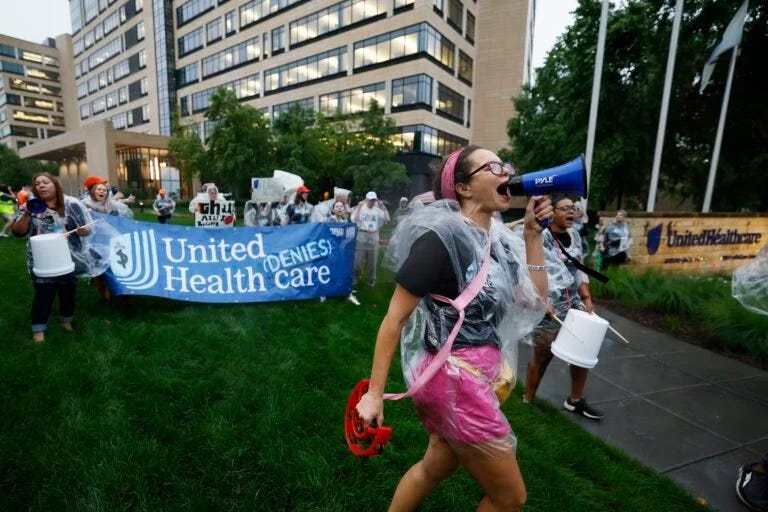Class Protection: Luigi Mangione’s Terror Charge
Exploring Class Solidarity and Unequal Accountability in America

I have avoided publicly writing about Luigi Mangione. The man has become a flashpoint for debate, a symbol onto which society projects its collective grief, frustration, anger, and lust. It feels as though every corner of the internet, every opinion column, and every social media post has something to say about him. Many of these perspectives align with my own thoughts, and I have hesitated to add my voice to the group, fearing that it might simply echo the obvious.
But then I read that Luigi Mangione is being charged with terrorism for the alleged murder of UnitedHealthcare CEO Brian Thompson. And while this case has already been framed as one of individual culpability, it strikes me as something far more systemic: a case about class solidarity, class consciousness, and the accountability—or lack thereof—of corporate power, particularly within the healthcare industry.
Before I dig into the terror charge against Luigi, I must remind everyone what an insurance company like UnitedHealthcare represents.
These are not neutral entities, simply facilitating care for those in need. They are profit-driven machines, and their decisions—or, more often, refusals—to cover care can have life-or-death consequences. Denying claims, delaying approvals, cutting hospital networks, and exploiting the fine print of policies—all of this amounts to a quiet but pervasive form of violence. It is a violence measured not in blood but in suffering, in untreated conditions, in lives cut short because someone couldn’t afford to fight through the bureaucracy of the American healthcare system.
If the definition of murder includes actions that knowingly result in the death of another, then we must at least entertain the question: How do we hold leaders of institutions like UnitedHealthcare accountable for the deaths their policies enable? How do we square the reality that while Mangione faces charges of terrorism for allegedly taking one life, entire systems that routinely lead to mass suffering and death remain untouched, their architects shielded by wealth and power?
This is not a new observation. We know that class solidarity protects those at the top. It ensures that the CEOs and board members who oversee the decisions that kill aren’t seen as murderers. Instead, they are called leaders, job creators, philanthropists. And when one of them is targeted—as Brian Thompson was—the machinery of power responds with swift and overwhelming force, not merely to punish the alleged perpetrator but to preserve the sanctity of the class itself.
This is the context in which I approach Mangione’s case. It is a story not just of one man’s alleged actions but of a justice system that reserves its harshest penalties for those who challenge power, even as it ignores the systemic harm caused by that same power.
And it is within this frame that I must also acknowledge my own proximity to this story. Like many Americans, I am a customer of UnitedHealthcare. Like far too many, I have suffered from their greed. For three months in early 2024, UnitedHealthcare and Mount Sinai, the hospital system I use in New York City, had a very public battle over pay which led to many patients being stripped of access to their trusted doctors. While executives haggled over billions, over 100,000 people—many with chronic illnesses or urgent medical needs (including myself)—were forced to delay treatments, switch providers, or risk financial ruin. This standoff wasn’t just a clash of titans; it was a brutal reminder that in American healthcare, patients are often collateral damage in the relentless pursuit of profit.
All of that said, health insurance companies being bastions of greed and harm does not completely absolve Luigi Mangione. Murder is a weight too heavy for metaphor; it is a finality that shatters lives and futures. And the truth is, his whiteness, his Ivy League pedigree, his storybook résumé, and yes, even his clean-cut, camera-ready attractiveness—has garnered him far more empathy than most would ever receive.
Yet none of this changes the fact that the machine of wealth and power is descending upon him with unparalleled ferocity, a ferocity that exposes the hypocrisy embedded in our so-called justice system. Think of how rarely the systems moves like this against the powerful. There are entire industries whose leaders make decisions that lead to preventable deaths every day, yet those same leaders are rarely, if ever, called to account.
This is because, to the architects of these systems, the average person who doesn’t belong to the wealth or power class simply doesn’t matter. Their lives, their struggles, their deaths—they are footnotes at best, rounding errors in the machinery of profit. It is a brutal truth, but one we are reminded of constantly: the decisions that destroy our lives, the policies that leave us vulnerable, the systems that push us into the cracks and shadows, are made by people who will never feel the consequences of their actions. And when the consequences come, it is always those at the bottom who bear the brunt.
This is why someone like Luigi Mangione can be charged with something as severe as terrorism while the insurrectionists of January 6th—who stormed the Capitol with the explicit goal of undermining democracy—faced charges that, in comparison, seem like slaps on the wrist. It is not the act itself that defines terrorism in the eyes of the system, but the target. You can only terrorize people that matter. And the January 6th mob, chaotic as they were, directed their rage at a system that, while vital to democracy, did not threaten the sanctity of wealth and power. Their actions were horrifying, but they didn’t aim their violence at the class that sits above it all.
Mangione, on the other hand, allegedly disrupted the sanctity of wealth itself. Brian Thompson wasn’t just a man; he was a symbol of the power that UnitedHealthcare represents. His death, if proven to be at Mangione’s hands, was not just the murder of a CEO but an affront to the power that ensures the continued dominance of the wealthy elite. And for that, the system descended upon Mangione with unparalleled force—not to protect democracy or justice but to preserve the status quo.
This terrorism charge isn’t about Luigi Mangione—not really. It’s about what he represents. It’s about the conversations his alleged act has sparked, conversations that those in power would rather suppress before they gain momentum. It’s about the images that have gone viral—the bullet casings stamped with “deny,” “defend,” and “depose,” a haunting indictment of the healthcare system’s ruthless efficiency in putting profit over people. Those images have reignited a simmering fury, pushing class consciousness to the forefront in a way that few other stories have.
Consider this: in the wake of the viral images, Author Jay Feinman’s Delay, Deny, Defend: Why Insurance Companies Don’t Pay Claims and What You Can Do About It has climbed bestseller lists across the country. The book is not new; it has lingered in the shadows of public awareness for years. But now, with this act and these images, it has found new life, new urgency, as people begin to connect the dots between the personal and the systemic, the individual suffering and the corporate indifference. People are beginning to ask questions they were never meant to ask.
This is why Luigi Mangione faces a terrorism charge—not because his alleged act is uniquely heinous but because it threatens to galvanize a movement. It is not about him as an individual but about what his story could inspire. The charge is a warning, a deterrent aimed at ensuring there are no future Luigis, no more sparks that could ignite the powder keg of class consciousness. The system is not just punishing one man—it is sending a message to anyone who might dare to disrupt the delicate equilibrium of wealth and power.

This is what happens when class solidarity among the elite collides with the faintest flicker of solidarity among the rest of us. The charge is a calculated effort to extinguish that flicker, to ensure that it doesn’t catch fire, that it doesn’t spread. Because what spreads is not just anger but awareness. And awareness, in a system built on ignorance and distraction, is the greatest threat of all.
If the justice system were truly impartial, we would see the same ferocity directed at the executives and board members whose decisions lead to untold deaths and hardship. But we don’t. Because their violence is normalized, sanitized, stripped of its human cost. It is calculated into quarterly earnings reports, laundered through the language of “cost-saving measures” and “strategic priorities.” Their violence is the foundation of the system, and the system cannot afford to hold itself accountable.
Luigi Mangione is being made an example of not because his alleged crime is extraordinary but because his alleged crime exposes the ordinary violence of the status quo. We are expected to suffer in silence. And if we dare to make noise, to fight back, to disrupt the sanctity of wealth and power, we are reminded—swiftly and brutally—that the system will always protect itself.
And so, the charge of terrorism looms not just over Luigi Mangione but over every future him. It is a reminder that in America, the greatest crime is not violence. It is disruption. It is exposing the lie that the lives of the many are expendable for the comfort of the few. And for that, the system will always descend with unparalleled force.
On the topic of class solidarity: our annual holiday fundraiser to bring toys, clothes, and food to those in need on Christmas Eve has raised $16,000 toward our $30,000 goal. With just two days left, we still have a long way to go—but every single dollar makes a difference. If you can give, even the smallest amount, please consider contributing. Together, we can make the holidays brighter for so many who need it most.







It is a reminder that in America, the greatest crime is not violence. It is disruption. It is exposing the lie that the lives of the many are expendable for the comfort of the few. And for that, the system will always descend with unparalleled force. Chilling.
Every, single word exposes the stench of America’s caste system. Brilliant.